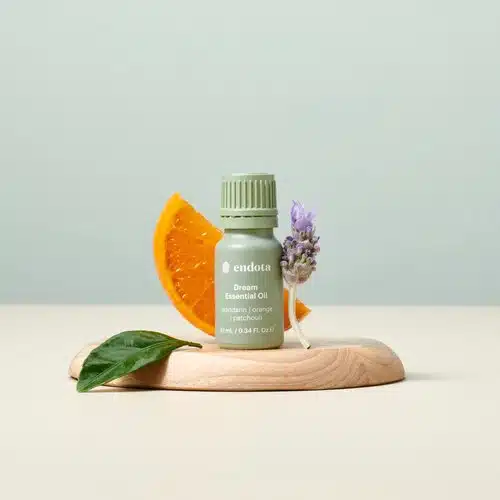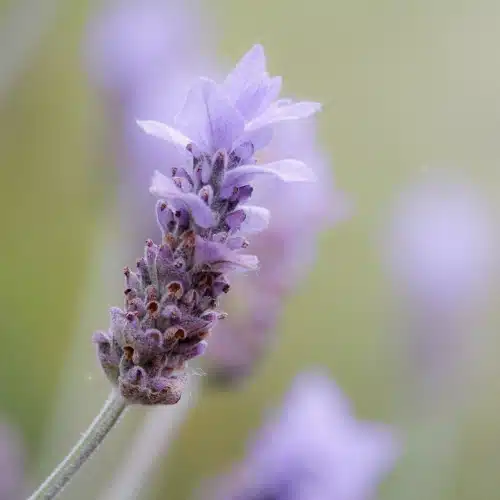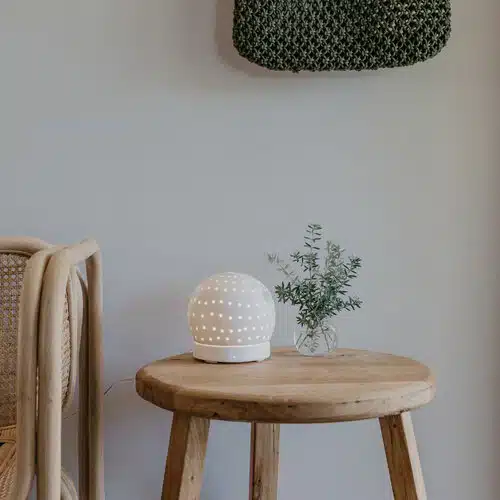The word essential oil is widely spoken about, often in relation to the mood-boosting benefits associated with this word. And while a common term, what does it actually mean?
We spoke with essential oil blend creator Michael Samperi to gain a better understanding of what essential oils are. That way the next time you add some drops of essential oil to an essential oil burner or diffuser you can have a deeper understanding of these 100% pure blends.
what is essential about essential oils?
The word ‘Essential’ in the term essential oils is derived from the essence of a plant’s fragrance and refers to the volatile compounds contained in the plant that make it fragrant.
Essential oils are used in various applications including pharmaceuticals, cosmetic products, food products, homecare products, essentially anywhere where scent is used. They are also used for their functional capabilities, most prominently in aromatherapy.

The word essential oil is widely spoken about, often in relation to the mood-boosting benefits associated with this word. And while a common term, what does it actually mean?
We spoke with essential oil blend creator Michael Samperi to gain a better understanding of what essential oils are. That way the next time you add some drops of essential oil to an essential oil burner or diffuser you can have a deeper understanding of these 100% pure blends.
what is essential about essential oils?
The word ‘Essential’ in the term essential oils is derived from the essence of a plant’s fragrance and refers to the volatile compounds contained in the plant that make it fragrant.
Essential oils are used in various applications including pharmaceuticals, cosmetic products, food products, homecare products, essentially anywhere where scent is used. They are also used for their functional capabilities, most prominently in aromatherapy.

how to make essential oil
An essential oil must first be extracted from a plant. The two most common extraction methods are steam distillation and cold-processing.
- Steam distillation
As the name suggests, this process uses steam to extract the scent of plants. The steam vapor passes through the plant matter extracting the volatile compounds that make up the scent, before the oil is separated from the remaining water. Sometimes the water, especially with oils such as rose, is kept as a hydrosol to be used in products. - Cold processing
This is generally used for citrus oils where the peel is crushed slightly to open the peel’s pores. A force is then used to release and extract the oil.
Both steam distillation and cold processing are gentle extraction processes.
what oils are essential oils?
There are many essential oils that are extracted from plants, including the plant’s fruit, leaves, stems and flowers.
Some popular varieties include:
- Citrus based essential oils, such as lemon, orange, bergamot and mandarin
- Floral based essential oils, such as lavender, ylang ylang, rose and geranium
- Fresh based essential oils, such as peppermint, tea tree and eucalyptus
- Woody based essential oils, such as patchouli, cedarwood, sandalwood and frankincense.
While the above essential oils can be easily categorised, other essential oils, such as petitgrain, can fall under more than one scent category. Different essential oils each carry their own unique aromatherapy benefits.

what oils are essential oils?
There are many essential oils that are extracted from plants, including the plant’s fruit, leaves, stems and flowers.
Some popular varieties include:
- Citrus based essential oils, such as lemon, orange, bergamot and mandarin
- Floral based essential oils, such as lavender, ylang ylang, rose and geranium
- Fresh based essential oils, such as peppermint, tea tree and eucalyptus
- Woody based essential oils, such as patchouli, cedarwood, sandalwood and frankincense.
While the above essential oils can be easily categorised, other essential oils, such as petitgrain, can fall under more than one scent category. Different essential oils each carry their own unique aromatherapy benefits.

what are the benefits of an essential oil blend being 100% pure?
100% pure essential oils are better in that not only do they smell beautiful and interesting, they also have a therapeutic effect. It is also nice to know they are from some of nature’s best ingredients, rather than chemically produced scents.
Oils that aren’t essential oils are simply fragrant oils, which are synthetic and designed specifically for scent only. There are also blends in the marketplace that are a combination of synthetic fragrance and essential oil, but these tend to lose their therapeutic efficacy.
If smelling an oil, you may notice a fake synthetic note, or that you sneeze or develop a runny nose. This can often indicate a synthetic fragrance with a chemically produced scent, rather than a pure essential oil blend.

essential oil storage
Essential oils should always be stored in a cool place under 30° celsius, preferably in a darkened place out of direct light. This is as UV light degrades an essential oil’s potency and the associated heat can shorten the essential oil’s shelf life.
essential oil carrying methods
With many ways to enjoy essential oils and experience their aromatherapy benefits, is there any difference when it comes to how your essential oil is carried?
Whether your essential oil is diffused via steam vapour, a reed diffuser, candle, oil burner, room spray, bath oil, or topically in skincare or with a roll-on oil, you will receive the same result and benefits. However, heating an essential oil can often release its full scent and amplify its therapeutic benefits.
How you use your essential oil is an entirely personal preference. Discover your perfect essential oil blend and carrying method to experience the benefits of essential oils for yourself.

essential oil storage
Essential oils should always be stored in a cool place under 30° celsius, preferably in a darkened place out of direct light. This is as UV light degrades an essential oil’s potency and the associated heat can shorten the essential oil’s shelf life.
essential oil carrying methods
With many ways to enjoy essential oils and experience their aromatherapy benefits, is there any difference when it comes to how your essential oil is carried?
Whether your essential oil is diffused via steam vapour, a reed diffuser, candle, oil burner, room spray, bath oil, or topically in skincare or with a roll-on oil, you will receive the same result and benefits. However, heating an essential oil can often release its full scent and amplify its therapeutic benefits.
How you use your essential oil is an entirely personal preference. Discover your perfect essential oil blend and carrying method to experience the benefits of essential oils for yourself.

